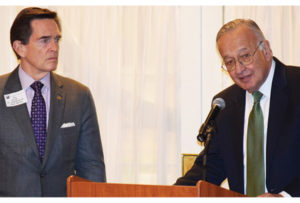Connecticut fiscal stability commission chiefs call for tough love strategies
In offering an overview of the final report from the Commission on Fiscal Stability and Economic Growth that was tasked to plot a course for saving Connecticut”™s ailing economy, commission Co-chairman James C. Smith facetiously insisted that the report could unite all sides of the political and economic spectrum.
“There is something in this report for everyone to hate,” deadpanned Smith, chairman and former CEO of Webster Bank, in an April 20 presentation before members of the Bridgeport Regional Business Council. Smith, who was joined by commission Co-chairman Robert Patricelli, noted that while the commission was supposed to dissolve on March 1, he had no intention of walking away from his work.
“Bob and I had 10 presentations this week,” he continued. “We”™re going to keep telling the story and not let this go away.”
 Smith noted that the 14-member commission sifted through more than 10,000 pages of research and held eight public hearings during its 76-day state-mandated timeline. The result, according to Smith, was a detailed view of the dismal fiscal environment for Connecticut, with a forecast $2.5 billion deficit by Fiscal Year 2022.
Smith noted that the 14-member commission sifted through more than 10,000 pages of research and held eight public hearings during its 76-day state-mandated timeline. The result, according to Smith, was a detailed view of the dismal fiscal environment for Connecticut, with a forecast $2.5 billion deficit by Fiscal Year 2022.
“The deficit is growing at a rate of $500 million a year,” he lamented, adding that the state is weighed down by unfunded liabilities that cannot be erased via legislation or executive order. “There are about 1 million homeowners in Connecticut and $100 million in unfunded liabilities is about a $100,000 mortgage on every person”™s home.”
Smith produced a chart that showed Connecticut was above the national average for income tax (6.97 percent versus the national 5.5 percent rate), corporate tax (7.5 percent versus 6.2 percent), sales tax (6.4 percent versus 5.1 percent), property tax (1.5 percent versus 1.1 percent) and estate tax (12 percent versus 4.3 percent). He also pointed out that households moving into Connecticut earn an average of $93,000 per year while those moving out of the state earn an average of $123,000.
“It took us a long time to dig this hole,” Smith said, throwing in a dig at a state government which he blamed for much of the problem. “Bad policies are causing people to lose their confidence.”
Patricelli, a former chairman and CEO at Women”™s Health USA, offered highlights from the commission”™s 119-page report, and he acknowledged that their recommendations were a mix of tough love and political compromise.
“This isn”™t about tweaking the dials,” he said. “We knew we had to be comprehensive, we knew we had to be bold. But it also had to be down the middle philosophically in order to be bipartisan. We needed a set of recommendations that would survive a change in administration. If the state”™s policies zigzag election after election, we won”™t be able to achieve stability.”
Among the most notable aspects of the report was the recommendation to eliminate the estate tax. “The estate tax is the proverbial juice that”™s not worth the squeeze,” he explained. “The squeeze is only about $130 million a year in tax revenue. The psychological and practical impact it is having on high-net-worth families ”” the state being only one of 14 around the country having an estate tax ”” is not worth the $130 million.”
The commission also called for an increase in business taxes, which Patricelli acknowledged came amid much debate. “We”™re not crazy about that idea, but we think it is so important to reposition the tax structure to go where there is some effort,” he said. “Business taxes in Connecticut are relatively low compared to other states.”
Patricelli also called for increasing the gas tax by seven cents over a four-year period, which he claimed would cost the average driver an additional $70 per year. He also envisioned a $15 minimum wage to be reached via incremental increases over the next four years. “The state has to be a place where people of all income levels can live, succeed and aspire. And it is awfully hard to live on $10.10 in Connecticut.”
Patricelli added the commission approved of the concept of electronic tolls in principle but had yet to see a viable solution for implementing this revenue stream. “We”™re the only state on the Atlantic Coast that doesn”™t have tolls,” he said. “The gas tax is going to peter out. There”™s got to be a substitute. There has to be a way to fund transportation infrastructure.”
Furthermore, the commission recommended that municipalities be given options to expand their revenue streams, including the charging of service fees in lieu of taxes to nonprofits. “Our big hospitals and colleges and universities surely can pay something for the services they use without losing their tax-exempt status,” Patricelli said.
However, Patricelli said that the limited time left in the current legislative session and a reluctance by legislators from both parties to vote for tax increases in an election year could doom the commission”™s recommendations. Still, he insisted that the private sector get involved in lobbying legislators on issues important to their operations.
“The private sector has to get back in the game,” he said. “We need to make it clear to our legislators that doing nothing is not an option. We need something approaching a private sector movement, basically to say to our elected representatives: ”˜Your election is in doubt if you don”™t approve at least some of the commission”™s suggestions.”™”
The commission”™s full report is online at http://ctstatefinance.org/assets/uploads/images/Commission-on-Fiscal-Stability-Report.pdf.